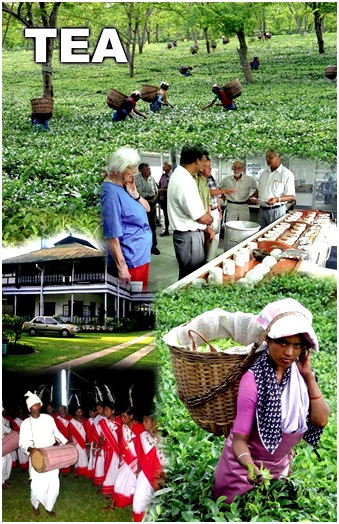
Green Gold of Assam
Tea tourism in Assam has tremendous potential. The tea industry has come a long way since 1823 and Assam, today, produces about 55% of the national output which contributes handsomely to our country’s economy.
 Assam Tea grown at sea level is known for its body, briskness, malty flavor, and strong, bright color. Though “Assam” generally denotes the distinctive black teas from Assam, the region produces relatively smaller quantities of green and white teas with their own distinctive characteristics. Lush green fields with mist covered plains at the backdrop, voices of cicadas and birds filling the air with no other sounds to compete with them, cool unpolluted wind carrying the drifting odour of fresh tea from the factories, are the attributes that can be attached with a typical tea estate.
Assam Tea grown at sea level is known for its body, briskness, malty flavor, and strong, bright color. Though “Assam” generally denotes the distinctive black teas from Assam, the region produces relatively smaller quantities of green and white teas with their own distinctive characteristics. Lush green fields with mist covered plains at the backdrop, voices of cicadas and birds filling the air with no other sounds to compete with them, cool unpolluted wind carrying the drifting odour of fresh tea from the factories, are the attributes that can be attached with a typical tea estate.
A tea tour through tea garden gives an insight into the different activities that vary from season to season. It teaches all about tea – its origin, how it is grown, tea tasting and its quality. During the winter months the dormant bushes are pruned to ensure vigorous growth during the warmer months. Once the rains begin, and the temperature rises, the gardens come alive with teams of colourfully dressed tea pluckers, predominantly ladies as they are said to be better able to pluck the delicate buds and leaves. The harvest, which goes continuously from March to November, is taken to the factory everyday where it undergoes an age old process of being turned into the finished product. All stages of the process are carefully controlled to ensure that the tea which leaves the factory is only of the highest quality, a quality that has made Assam tea world famous.
For city dwellers, staying in colonial tea estate bungalows of Upper Assam – Balipara, Jorhat and Dibrugarh would be a real treat and apt location for relaxing the tired mind, totally an ideal place to spend a holiday. A tea tour would include nature walks around heritage gardens giving a chance to harvest with the pluckers and prepare their own tea and experience the luxurious heritage Raj period hospitality that the British manager and his memsahib enjoyed which will bring back the nostalgia of that unique and graceful lifestyle. Also enjoy the traditional dance of the tea tribes who came here during the British Era from Orrisa and Cooch Bihar to cultivate the so called ‘Green Gold’ – JHUMUR and folk dance of Assam – BIHU. In the evening you can simply relax on the lawns and soak up the enchanting atmosphere with bonfire and sipping your choice of Assam Tea with snacks made out of the tender Tea leaves – one bud and two leaves. Thus touring the tea plantations would surely be a good experience for tea enthusiasts.
Visit to the factories would give an insight as to how different types of tea like – CTC, Orthodox, etc are made in different machines and process. Followed by the process of Tea tasting of 8 to 12 cups in variety and flavours is altogether an interesting aspect of the tour.
Best time for Tea tours is from October to March. The Guwahati Tea Auction Centre (GTAC) is one of the busiest tea trading facilities in the world. It is located in Guwahati and its primary commodity under the hammer is Assam tea. It was established in 1970. It has seen the largest volume of CTC tea auction in the world. The tea auction is held twice a week at Guwahati – Tuesday & Wednesday. The visit takes about an hour to observe the proceedings at the centre. Visit a Tea Brokerage Firm to know more about tea tasting, its quality and pricing.
The Tocklai Tea Research Institute was established in 1911, at a site near the River Tocklai in Jorhat, Assam. The beginning of a new era of tea research in India was marked by the establishment of the Scientific Department of Indian Tea Association (ITA) in the year 1900. This was consolidated with the creation of the Tocklai Experimental Station in 1911. The formation of the Tea Research Association (TRA) in 1964 with Tocklai at the centre of all activities further expanded the horizon of tea research to cover the entire Northeast India. Research on all aspects of tea cultivation and processing is carried out at the Tocklai Tea Research Institute, Jorhat, the oldest and the largest research station of its kind in the world.
